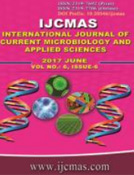


 National Academy of Agricultural Sciences (NAAS)
National Academy of Agricultural Sciences (NAAS)

|
PRINT ISSN : 2319-7692
Online ISSN : 2319-7706 Issues : 12 per year Publisher : Excellent Publishers Email : editorijcmas@gmail.com / submit@ijcmas.com Editor-in-chief: Dr.M.Prakash Index Copernicus ICV 2018: 95.39 NAAS RATING 2020: 5.38 |
Dietary selenium supplementation in the poultry has been regularly practiced using the inorganic and organic forms to enhance the growth and antioxidant defence system. These forms have the limitations of having narrow margin of safety and non specific binding to tissue proteins, hence an alternate form of selenium i.e. nano selenium having greater potential as poultry and livestock feed supplement with higher bioavailability, higher margin of safety and seven fold lower acute toxicity was prepared using starch, ascorbic acid and bovine serum albumin. The nanoselenium (15-40 nm) synthesized were characterized for purity, morphology and size by XRD analysis, transmission electron microscopy and UV spectrophotometry. To investigate the role of selenium forms and levels on the meat characteristics of broiler chickens, a biological trial was conducted in one hundred and eighty day old straight run chickens, divided into six treatment groups each having three replicates. The treatment groups were supplemented with 0.3 mg sodium selenite /kg (T2), 0.3 mg organic selenium /kg (T3), nanoselenium at three levels viz.0.15 (T4), and 0.3 (T5) and 0.6 mg/kg (T6) and T1 group was the control, fed with the basal diet alone. The birds were slaughtered at the end of 42nd day and breast meat characteristics - pH, drip loss and lipid peroxidation were estimated. The results of the study indicated that the nanoselenium supplemented chickens had significant (p<0.05) reduction in breast muscle drip loss and lipid peroxidation as compared with the control. The selenium levels and forms did not influence the pH of breast muscle both at 24 and 48 hrs. Thus nanoselenium (0.3 – 0.6mg /kg diet) can be fed to the broiler chickens to reduce the drip loss and lipid peroxidation and thereby enhance the meat properties.
 |
 |
 |
 |
 |